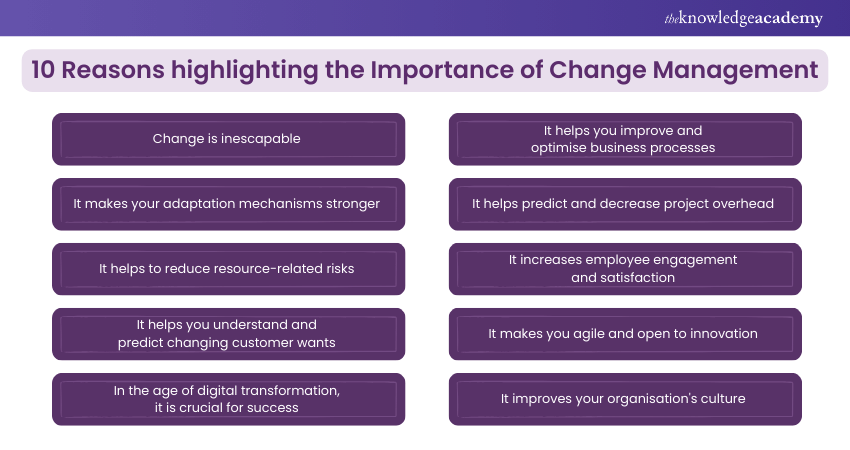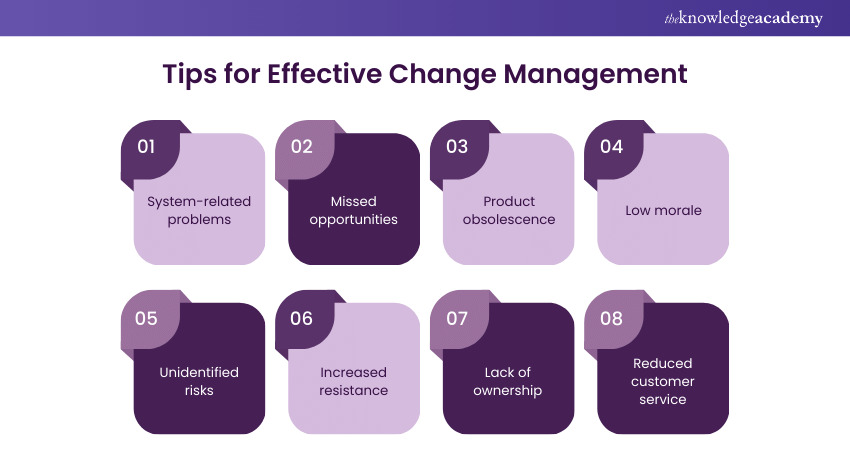We may not have the course you’re looking for. If you enquire or give us a call on +358 942454206 and speak to our training experts, we may still be able to help with your training requirements.
Training Outcomes Within Your Budget!
We ensure quality, budget-alignment, and timely delivery by our expert instructors.

Change Management helps organisations and individuals adapt and improve in changing environments. It is crucial for business success and personal growth. Statista reports that 43% of large companies’ high-priority projects use Change Management. In this blog, we will discover the Importance of Change Management and how it can benefit your organisation.
Table of Contents
1) What Is an organisational Change Management process?
2) 10 Reasons highlighting the Importance of Change Management
a) Change is inescapable
b) It makes your adaptation mechanisms stronger
c) It helps to reduce resource-related risks
d) It helps you understand and predict changing customer wants
e) In the age of digital transformation, it is crucial for success
3) Tips for effective Change Management
4) Conclusion
What Is an organisational Change Management process?
An organisational Change Management process is a five-step method that guides an organisation from its current situation to a new desired one. This method is useful and effective for introducing new technology, rebranding, or reorganising your organisation, among other examples.
The Change Management process prepares employees with the skills and tools they need to cope with the change and thrive. It also sets clear expectations and clarifies everyone’s role and duties in this new phase.
Gartner reports that 75% of organisations anticipate an increase in the kinds of major change initiatives they will undertake in the next three years. Change can happen at any moment, and a change management process, guided by various change management models, can ensure your business runs smoothly.
Change Management can help you achieve your goals in the following ways:
a) It enhances employee engagement and lowers frustration with your operational and technological changes.
b) It respects employees’ feedback and time.
c) It reduces the costs and risks of change.
d) It improves Project Management and project returns on investment.
e) It creates consistency and efficiency in managing change as your organisation grows.
Building a successful Change Management process takes work, but it is possible. It demands a lot of effort, but you can accomplish it with persistence and dedication.
10 Reasons highlighting the Importance of Change Management
Lewin's Change Management Model is a process that facilitates the continuous improvement of project-focused organisations by regulating and overseeing changes to ensure that they positively impact project success. Change management tools play a crucial role in this process, helping to track, manage, and streamline changes effectively. Change Management needs to be integrated into every phase of a project abiding by the change management principles, together with ongoing processes throughout all stages, including the planning and execution phases. Let us explore the following factors to understand the need for Change Management:

1) Change is inescapable
The business world is always evolving, and you need to be prepared for the effects of change on your organisation. Change Management helps you stay ahead and avoid shocks. Instead of treating change as a one-off event, you should see it as a natural part of your organisation’s life cycle.
Change is certain, and it will impact your business. By foreseeing and managing change before it becomes disruptive, you can keep your business on track and adapt quicker.
2) It makes your adaptation mechanisms stronger
To achieve sustainable success, you must adapt to changing market conditions. A Change Management strategy helps you modify your plans and processes to new opportunities and risks. You need to identify what changes are affecting your organisation and business. It could include changes in the law, customer preferences, or technology.
You can devise a plan to boost your adaptability after evaluating your organisation’s readiness for change. This could include having a cross-functional team to implement new strategies or training on new technologies.
Discover the Impact of Change Management Salaries on Career Growth and Organizational Success!
3) It helps to reduce resource-related risks
Success is heavily reliant on having the necessary resources, but there is always a possibility that unforeseen changes may cause things not to go differently than planned. That's why it is essential to have a Change Management plan in place. This plan will prepare you for situations by identifying the suitable people, systems, and processes required to execute your revised plans effectively.
A robust Change Management strategy will help reduce resource-related risks by prioritising change requests and finding a solution to resolve those requests in the least disruptive way possible. People can at times be a bit unreliable as they may take unexpected time off, go on vacations, or choose to pursue other challenges. These factors may derail your business plans and require an urgent Change Management process.
4) It helps you understand and predict changing customer wants
It's always a challenge to understand what your customers need. Change Management can be helpful as it enables you to stay updated with the new ways of satisfying their desires. It helps anticipate changes in their needs and behaviours while also developing methods for understanding these changing needs more quickly than your competitors. As we constantly change and adapt to the world around us, our customers also evolve and change. With Change Management, your company could stay caught up as new waves of technology, regulation, and culture come into play.
Discover the Best Change Management Books! Read our top picks and transform your organization today!
5) In the age of digital transformation, it is crucial for success
Widespread digitisation has significantly impacted our personal and professional lives. In today's digital world, businesses must adapt to meet customers' evolving needs. Companies that recognise the importance of organisational Change Management and have embraced this new reality are achieving competitive success, improved employee satisfaction and communication, greater agility in adapting to market changes, improved time-to-market for new products and services, reduced costs, and enhanced productivity.
These organisations have implemented Change Management processes to efficiently manage this constant flux while remaining focused on strategic differentiation.
Ready to lead and drive success? Enroll in our Change Management Certification program to gain the skills and credentials you need.
6) It helps you improve and optimise business processes
Staying competitive in a constantly changing market, organisations must continuously improve, optimise, and streamline their business processes. Failure to adapt can quickly lead to obsolescence, loss of competitive edge, and even business failure. Change Management is facilitating these necessary cultural changes within an organisation.
By foreseeing the impact of change, you can avoid potential problems before they become serious. The Change Management process involves identifying issues, determining required resources, implementing solutions, and evaluating their effectiveness. This process can be applied to an organisation's mission, vision, and goals to ensure they meet the dynamic marketplace's needs.
7) It helps predict and decrease project overhead
Having a Change Management process in place is crucial. Without it, you won't have a plan to deal with unexpected changes. This leads to a situation where you're trying to change things on the fly as problems arise. Making last-minute changes puts a lot of stress on everyone involved in the project. This stress leads to miscommunication and missed deadlines, which causes unnecessary problems.
On the other hand, if you have a robust Change Management process, everyone understands what to expect when changes occur. So, when last-minute changes need to be implemented, it's not a big shock because your team has had time to prepare for it.
8) It increases employee engagement and satisfaction
One of the main reasons why Change Management is crucial for organisational success is that it improves employee engagement and satisfaction. By helping people cope with organisational transitions, they can feel more invested in the changes and adapt better.
When an organisation makes changes that its employees dislike or are unprepared for, they are less likely to support its vision, leading to lower productivity and satisfaction. Therefore, effective Change Management is vital to ensure smooth and low-disruption organisational changes.
Get ready for your interview with our top Change Management Interview Questions.
9) It makes you agile and open to innovation
Organisational success relies on adapting to changes in the market or technology, even if that means changing for the sake of change. Agile organisations can quickly and creatively respond to changes in the marketplace, using new products as a catalyst to create something even better and more competitive.
An organisation's agility is vital for embracing new ideas that could revolutionise the industry. An open-minded approach can help identify new ideas that can be easily implemented to modernise the company and surpass expectations.
10) It improves your organisation's culture
Managing change in a workplace environment involves identifying potential issues before they escalate to a level that disrupts the workflow. It is important to ensure that any changes are well-communicated to employees so they understand what is happening and its impact on them directly. Effective communication helps ensure that employees feel heard and valued, which can boost morale and increase productivity, as well as make it trouble-free to recruit and retain top talent.
Improve your understanding of Change Management by signing up for our Change Management Green Belt Course now!
Tips for Effective Change Management
Not implementing Change Management can have serious repercussions for a business. You must understand the pitfalls of a poor change strategy to avoid them and improve your business performance. Some of the drawbacks of not implementing Change Management are:

a) System-related problems
Businesses need to continuously improve their systems to keep up with the latest trends and technologies in their industry. Continuous Change Management helps them do that and stay ahead of their competitors. If you have a short-term change plan, you might miss out on new system features and updates that could give you an edge. It means your systems won’t match your business goals.
b) Missed opportunities
Change Management helps you explore possibilities and thoroughly research your competitors, markets, and customers. Without enough research and discussion, you won’t be able to compete at your best and seize new opportunities. It means you won’t reach your full potential as a business.
c) Product obsolescence
Product Obsolescence is a major issue for businesses that sell products or services to customers. Products or services that are new today can become outdated tomorrow as customer preferences and technologies change. If you resist change, you won’t be able to adapt to these changes, and you’ll lose your market share. It is because you’ll keep offering products or services that customers don’t need or want anymore.
d) Low morale
Businesses that don’t change can demoralise their employees and make them feel like they’re not growing or advancing in their careers. When businesses don’t invest in their employees, they lose them to companies offering better opportunities. Also, bad Change Management can confuse employees, especially if they don’t have clear and effective communication channels.
Register in our specialized Change Management Assessments Training. Gain the expertise to evaluate, strategize, and implement effective change initiatives. Elevate your capabilities – sign up now!
e) Unidentified risks
Change Management helps you consider all the aspects of a new proposal before implementing it. This way, you can identify and reduce the risks that might arise along the way. A poor response to change can lead you to make unrealistic promises, create system errors, or alienate employees.
f) Increased resistance
Implementing change in a business requires you to communicate with your employees and get their feedback on the proposed changes. Without this, employees might feel like you’re imposing change on them, which can sometimes cause them to resist or oppose it. Make sure you consult your employees and give them a chance to voice their concerns and influence the decisions that affect their work.
g) Lack of ownership
Business change requires constant monitoring and evaluation to ensure the changes are relevant and successful. It requires someone to take responsibility for the change and ensure it lasts after the business returns to normal. Without this ownership, businesses fail to create a shared vision that guides the change in the right direction. It makes the initial changes useless and wastes time and resources.
h) Reduced customer service
Remember, employees affect how customers perceive your business. Employees who are unhappy or confused about the change might show it when interacting with customers. If employees can’t answer customer questions or respond negatively, businesses lose customers and damage their reputations.
Dive into the detailed Case Study on Change Management
Conclusion
Change Management can significantly improve the overall functioning of organisations. We hope this blog has helped improve your understanding of the Importance of Change Management and how it benefits organisations.
Learn more about all the aspects of Change Management with our Change Management Practitioner Course now!
Frequently Asked Questions

Change Management can help your organisation achieve various benefits, such as:
a) Increased competitive advantage and growth
b) Improved employee engagement and satisfaction
c) Reduced costs and risks of change
d) Enhanced customer loyalty and retention
e) Optimised business processes and performance
f) Fostered innovation and learning culture

To implement Change Management in your organisation, you need to follow these steps:
a) Identify the need and scope of change
b) Develop a vision and strategy for change
c) Communicate and engage with stakeholders
d) Implement and manage the change
e) Evaluate and sustain the change

The Knowledge Academy takes global learning to new heights, offering over 30,000 online courses across 490+ locations in 220 countries. This expansive reach ensures accessibility and convenience for learners worldwide.
Alongside our diverse Online Course Catalogue, encompassing 17 major categories, we go the extra mile by providing a plethora of free educational Online Resources like News updates, Blogs, videos, webinars, and interview questions. Tailoring learning experiences further, professionals can maximise value with customisable Course Bundles of TKA.

The Knowledge Academy’s Knowledge Pass, a prepaid voucher, adds another layer of flexibility, allowing course bookings over a 12-month period. Join us on a journey where education knows no bounds.

Discover Change Management courses with The Knowledge Academy, offering Change Management Certification, Foundation and Practitioner courses. Designed for diverse skill levels, these courses provide a comprehensive understanding of Change Management.
Whether you are starting your journey or aiming to elevate your Project Management expertise, immerse yourself in our Project Management blogs to discover more insights!
Upcoming Business Skills Resources Batches & Dates
Date
 Change Management Foundation & Practitioner
Change Management Foundation & Practitioner
Mon 6th Jan 2025
Mon 13th Jan 2025
Mon 20th Jan 2025
Mon 27th Jan 2025
Mon 3rd Feb 2025
Mon 10th Feb 2025
Mon 17th Feb 2025
Mon 24th Feb 2025
Mon 3rd Mar 2025
Mon 10th Mar 2025
Mon 17th Mar 2025
Mon 24th Mar 2025
Mon 31st Mar 2025
Mon 7th Apr 2025
Mon 28th Apr 2025
Mon 12th May 2025
Mon 19th May 2025
Mon 9th Jun 2025
Mon 23rd Jun 2025
Mon 7th Jul 2025
Mon 21st Jul 2025
Mon 4th Aug 2025
Mon 18th Aug 2025
Mon 1st Sep 2025
Mon 15th Sep 2025
Mon 29th Sep 2025
Mon 13th Oct 2025
Mon 20th Oct 2025
Mon 27th Oct 2025
Mon 3rd Nov 2025
Mon 10th Nov 2025
Mon 17th Nov 2025
Mon 24th Nov 2025
Mon 1st Dec 2025
Mon 8th Dec 2025
Mon 15th Dec 2025







 Top Rated Course
Top Rated Course



 If you wish to make any changes to your course, please
If you wish to make any changes to your course, please


